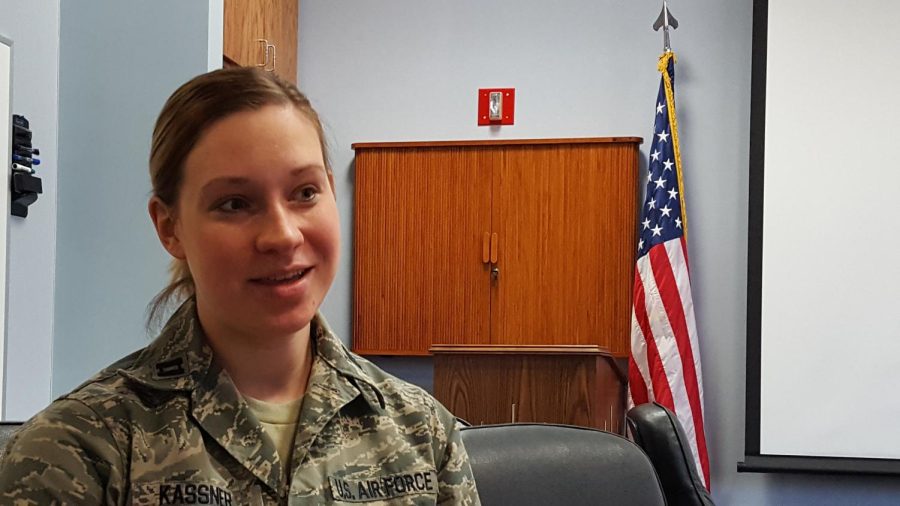Female cadet serves as role model in ROTC
April 18, 2017
Captain Julie Kassner’s involvement in the Reserve Officer’s Training Corps (ROTC) means a lot to the 72 cadets involved in the Air Force ROTC program, but it means even more to the handful of women.
“She never complains, she shows an example and loves developing us into leaders,” said senior international relations major and cadet Hunter Rininger. “(The) key word is ‘show,’ because although she does tell, her actions say a lot.”
Kassner, who is also a professor in aerospace studies, began her involvement in the Air Force at Bowling Green State University. She learned Russian and participated in the AFROTC program.
Kassner was commissioned as an intelligence officer after graduating. Her skill with the Russian language proved beneficial, allowing her to travel to three bases in the US. Most recently, she was in Oklahoma at Tinker Air Force Base.
Kassner arrived at Kent State in June — four years into her Air Force career — and this brought her the joy of teaching others.
Kassner said she learned the same things during her time in the AFROTC program that she’s teaching now. It was a different time for women who wanted to be involved in the military while at college. She said she was one of the only woman in the program all four of her years.
As of January 2016, however, women are officially allowed to serve in a combat position, replacing the 1994 rule prohibiting it.
In 2016, the Navy and Air Force branches made up the highest percentage of women in the military with 16.4 percent and 19.1 percent, respectively.
Kent State’s ROTC program currently fields 11 female cadets this semester. For those women, Kassner serves as a role model.
“It is cool to see a woman come in and teach us,” said freshman pre-nursing major Hannah Schwegmann. “We can have casual conversations that are both professional and personal.”
Kassner’s husband works at Kent State as an assistant learning specialist. Kassner said she feels the constant moving may hinder his ability to find work at his degree level.
“Finding someone who is willing to put up with the constant moving and long hours is important,” she said. “They are in the military as much as you are.”
Kassner, who is eight months pregnant, said her husband is strong.
“We are expecting a baby soon, so it could be difficult for both of us to be working and taking care of a child,” Kassner said. “I’m not sure what it’s like to be in his position, but I appreciate it.”
Out of the near 1.5 million members in the military, 43 percent have children.
“This is something I am not concerned about,” said cadet Sophia Siddall. “Family is so far from now that I am not even caring about it.”
Siddall has served in leadership positions for the AFROTC flight wing since field training last summer. Siddall said she is interested in being involved in Special Operations after graduation, a challenging combat-oriented field that has opened up to women recently.
All five wing leaders were female last semester.
“Everyone’s leadership personality is different,” Siddall said. “For me, I want to mentally challenge those who just got back from field training. Make them uncomfortable, but help guide them and show they can do these things.”
Not compromising is a key for the women in the program.
“It is important for the upper-class ladies to mentor them with how it really is,” Rininger said. “All the ladies need to set good examples and be a confident woman.”
Twice this year, Rininger hosted a get-together for the women in the program — a time to mentor the underclass cadets and have fun.
Schwegmann joined the program with intentions of entering the Air Force following graduation. Growing up, the military was a large part of her life, with her grandpa and uncles having served, Schwegmann said.
“Having leaders in Siddall and Rininger inspire me through fitness and more personally,” Schwegmann said. “Seeing Kassner, about to have a baby but still (leading) labs and work is very inspiring too.”
Kassner said she takes pleasure in cadets looking up to her because she knows people need an example. She does recognize she is an instructor for more than just the women in the program though.
“Overall, all the cadets are ambitious and have that drive to be a leader,” Kassner said.
Troy Lee is the military reporter, contact him at [email protected].

























